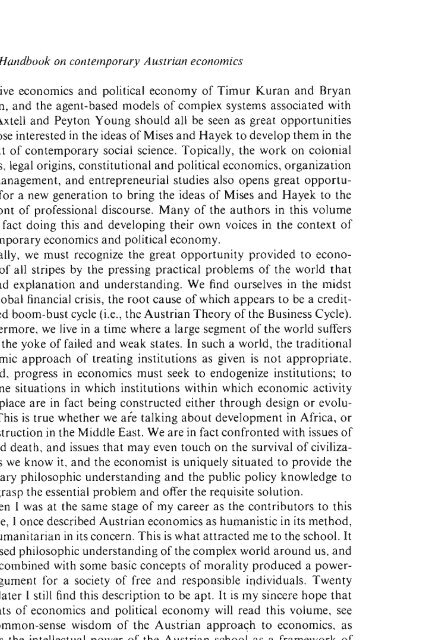Handbook on Contemporary Austrian Economics
Handbook on Contemporary Austrian Economics
Handbook on Contemporary Austrian Economics
You also want an ePaper? Increase the reach of your titles
YUMPU automatically turns print PDFs into web optimized ePapers that Google loves.
164 <str<strong>on</strong>g>Handbook</str<strong>on</strong>g> <strong>on</strong> c<strong>on</strong>temporary <strong>Austrian</strong> ec<strong>on</strong>omics<br />
cognitive ec<strong>on</strong>omics and political ec<strong>on</strong>omy of Timur Kuran and Bryan<br />
Caplan, and the agent-based models of complex systems associated with<br />
Rob Axtell and Peyt<strong>on</strong> Young should all be seen as great opportunities<br />
for those interested in the ideas of Mises and Hayek to develop them in the<br />
c<strong>on</strong>text of c<strong>on</strong>temporary social science. Topically, the work <strong>on</strong> col<strong>on</strong>ial<br />
origins, legal origins, c<strong>on</strong>stituti<strong>on</strong>al and political ec<strong>on</strong>omics, organizati<strong>on</strong><br />
and management, and entrepreneurial studies also opens great opportunities<br />
for a new generati<strong>on</strong> to bring the ideas of Mises and Hayek to the<br />
forefr<strong>on</strong>t of professi<strong>on</strong>al discourse. Many of the authors in this volume<br />
are in fact doing this and developing their own voices in the c<strong>on</strong>text of<br />
c<strong>on</strong>temporary ec<strong>on</strong>omics and political ec<strong>on</strong>omy.<br />
Finally, we must recognize the great opportunity provided to ec<strong>on</strong>omists<br />
of all stripes by the pressing practical problems of the world that<br />
demand explanati<strong>on</strong> and understanding. We find ourselves in the midst<br />
of a global financial crisis, the root cause of which appears to be a creditinduced<br />
boom-bust cycle (i.e., the <strong>Austrian</strong> Theory of the Business Cycle).<br />
Furthermore, we live in a time where a large segment of the world suffers<br />
under the yoke of failed and weak states. In such a world, the traditi<strong>on</strong>al<br />
ec<strong>on</strong>omic approach of treating instituti<strong>on</strong>s as given is not appropriate.<br />
Instead, progress in ec<strong>on</strong>omics must seek to endogenize instituti<strong>on</strong>s; to<br />
examine situati<strong>on</strong>s in which instituti<strong>on</strong>s within which ec<strong>on</strong>omic activity<br />
takes place are in fact being c<strong>on</strong>structed either through design or evoluti<strong>on</strong>.<br />
This is true whether we are talking about development in Africa, or<br />
rec<strong>on</strong>structi<strong>on</strong> in the Middle East. We are in fact c<strong>on</strong>fr<strong>on</strong>ted with issues of<br />
life and death, and issues that may even touch <strong>on</strong> the survival of civilizati<strong>on</strong><br />
as we know it, and the ec<strong>on</strong>omist is uniquely situated to provide the<br />
necessary philosophic understanding and the public policy knowledge to<br />
both grasp the essential problem and offer the requisite soluti<strong>on</strong>.<br />
When I was at the same stage of my career as the c<strong>on</strong>tributors to this<br />
volume, I <strong>on</strong>ce described <strong>Austrian</strong> ec<strong>on</strong>omics as humanistic in its method,<br />
and humanitarian in its c<strong>on</strong>cern. This is what attracted me to the school. It<br />
promised philosophic understanding of the complex world around us, and<br />
when combined with some basic c<strong>on</strong>cepts of morality produced a powerful<br />
argument for a society of free and resp<strong>on</strong>sible individuals. Twenty<br />
years later 1 still find this descripti<strong>on</strong> to be apt. It is my sincere hope that<br />
students of ec<strong>on</strong>omics and political ec<strong>on</strong>omy will read this volume, see<br />
the comm<strong>on</strong>-sense wisdom of the <strong>Austrian</strong> approa~h to ec<strong>on</strong>omics, as<br />
well as the intellectual power of the <strong>Austrian</strong> school as a framework of<br />
analysis for the most pressing problems of our age. The volume is not an<br />
opportunity for indoctrinati<strong>on</strong> into a settled body of ec<strong>on</strong>omic thought,<br />
but an invitati<strong>on</strong> to inquiry to the next generati<strong>on</strong> of students guided by a<br />
new generati<strong>on</strong> of scholar/teachers who have learned from past thinkers,

















